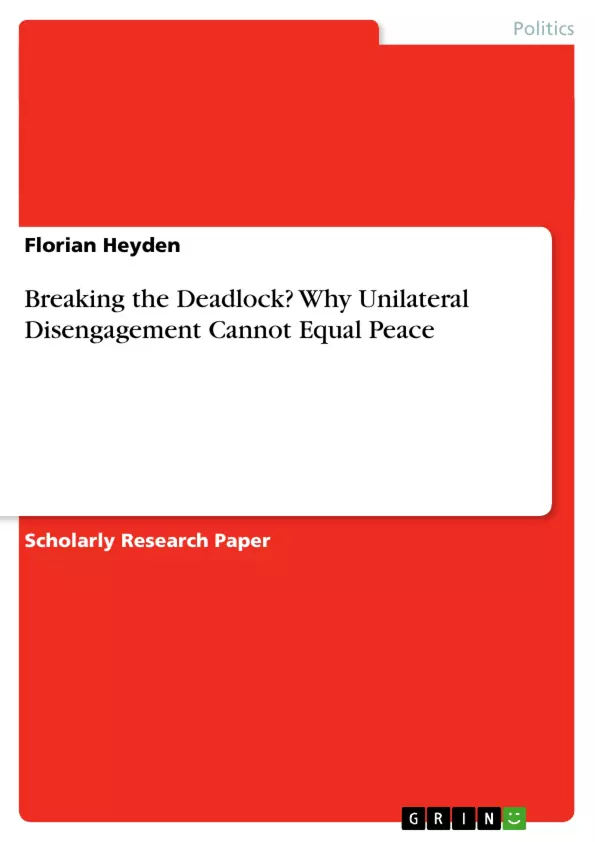This paper looks at the potential of breaking the deadlock of the Israeli-Palestinian Conflict through a unilateral “gazaesque” withdrawal of Israel from the remaining Occupied Territories. Since the Oslo agreement, Palestinian leaders have found that a state cannot be created by a simple declaration - peace and statehood have so far stumbled over a number of issues and it is questionable if a unilateral disengagement will change these: we will underline the reasons why this is so and why it will not be able to bring peace and coexistence.
While events so far have not changed the fact that a Palestinian State remains a non-entity, they have equally shown all but the most hawkish actors that, despite the determined pursuit of policies designed to make Israeli dominance permanent, it will not be able to maintain the occupation indefinitely against local resistance and a growing refusal and dissent of Israelis against occupation1. But what if Israel would opt for an all-out unilateral withdrawal behind its ‘separation barrier’? Could such a move bring about an independent Palestinian State - ‘instant-peace in the Middle East’ - or could it inversely cause an explosive knock-off reaction on the region? Could it lead to the perpetration of past cycles of violence?
Inhaltsverzeichnis (Table of Contents)
- Introduction
- 1st part - Reflections on Palestine and its People
- 2nd part - Elusive Peace Pending
- 3rd part - The Challenge of Change and the Change of Challenge
- Conclusion
Zielsetzung und Themenschwerpunkte (Objectives and Key Themes)
This paper examines the possibility of resolving the Israeli-Palestinian conflict through a unilateral Israeli withdrawal from the remaining Occupied Territories, drawing parallels with the disengagement from Gaza. The author explores whether such a move could foster peace and coexistence, analyzing the challenges and complexities involved in achieving a Palestinian state.
- The potential of unilateral disengagement as a solution to the Israeli-Palestinian conflict.
- The internal complexities and divisions within Palestinian society.
- The challenges of creating a Palestinian state, including social, economic, and political hurdles.
- The role of different Palestinian factions and their impact on peace initiatives.
- The potential consequences of unilateral disengagement for the region.
Zusammenfassung der Kapitel (Chapter Summaries)
- Introduction: This chapter introduces the paper's main topic: the viability of a unilateral Israeli withdrawal from the Occupied Territories as a means of achieving peace. It raises questions about the feasibility of such a move and its potential impact on the Israeli-Palestinian conflict.
- 1st part - Reflections on Palestine and its People: This chapter examines the complexities of Palestinian society, highlighting the diverse social groups and political factions within the Palestinian community. It explores the internal divisions and challenges facing Palestinian society, including economic hardship, social fragmentation, and the impact of occupation.
- 2nd part - Elusive Peace Pending: This chapter focuses on the political landscape of the Occupied Territories and the role of different Palestinian groups, such as Fatah, Hamas, and the PLO, in the pursuit of peace. It analyzes the challenges of achieving a unified Palestinian response to peace initiatives and the role of internal sabotage in hindering progress.
Schlüsselwörter (Keywords)
The key topics and concepts explored in this paper include: Israeli-Palestinian conflict, unilateral disengagement, Occupied Territories, Palestinian state, peace process, Palestinian society, internal divisions, political factions, Fatah, Hamas, PLO, social resilience, economic hardship, and violence.
Frequently Asked Questions
Can unilateral disengagement bring peace to the Middle East?
According to the paper, a simple withdrawal is unlikely to bring peace because core issues like statehood, internal divisions, and security remain unresolved.
What are the internal challenges within Palestinian society?
Palestinian society faces social fragmentation, economic hardship, and deep political divisions between factions like Fatah and Hamas.
Why did the Oslo agreement fail to create a state?
Peace and statehood stumbled over issues such as territorial control, security requirements, and the inability to reach a final status agreement.
What is a "gazaesque" withdrawal?
It refers to the model of the 2005 Israeli disengagement from Gaza, which was a unilateral move without a negotiated agreement with the Palestinian side.
Could unilateralism lead to more violence?
The paper suggests that without a coordinated political framework, such moves could trigger explosive reactions and perpetuate cycles of violence in the region.
- Quote paper
- M.A. Florian Heyden (Author), 2006, Breaking the Deadlock? Why Unilateral Disengagement Cannot Equal Peace, Munich, GRIN Verlag, https://www.grin.com/document/51099



